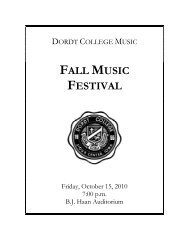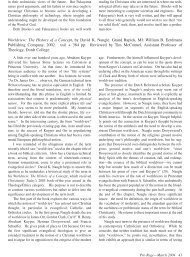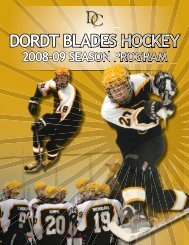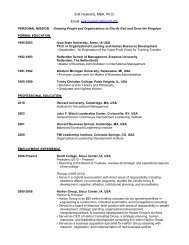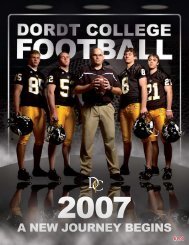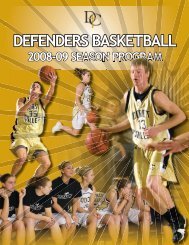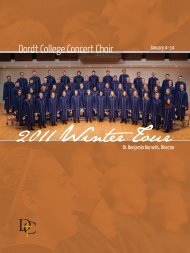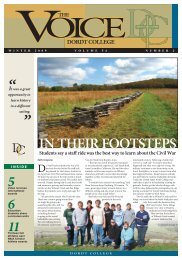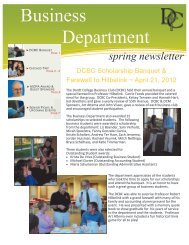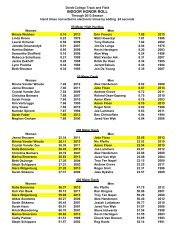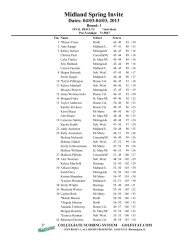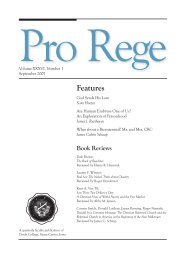June 2009 - Dordt College
June 2009 - Dordt College
June 2009 - Dordt College
Create successful ePaper yourself
Turn your PDF publications into a flip-book with our unique Google optimized e-Paper software.
this music that gave it meaning for a nation at that<br />
time<br />
What is our hoped-for outcome In general,<br />
we hope to develop a Christian voice in the field<br />
of musicology on topics related to music and crisis,<br />
music and justice. I should be saying “Christian<br />
voices,” for we envision no single Christian<br />
response to these issues—though certainly a main<br />
note in all Christian voices is that Christians care<br />
deeply about justice because of the character and<br />
the command of our God. In regard to the variety<br />
of topics, specific voices will develop specific nuances<br />
of Christian thought. We aim to amplify the<br />
voices of Christian music scholars, whose thinking<br />
about music and whose professional engagement<br />
with musicology cannot help being shaped<br />
by their identity as Christians.<br />
I now return to the question posed at the<br />
beginning of this paper. By calling the use of music<br />
as a weapon a “misappropriation,” the AMS implies<br />
that music has some other true, essential nature,<br />
but it does not spell out what this nature is. What<br />
would a Christian response to this question be<br />
What do we believe about how God created music<br />
and its appropriate use in God’s world Similarly,<br />
what Christian response might we make to the use<br />
of music as a tool for propaganda or the control of<br />
musical composition and performance by those in<br />
power When, if ever, are such practices justified,<br />
and why What might a Christian response be to<br />
the seeming mutability of musical meaning evident<br />
in the times of crisis How is it that music can hold<br />
meaning and significance for a given community,<br />
and is that meaning entirely relative What in<br />
the design and structure of the music itself (that<br />
traditional focus of historical musicology) is fixed,<br />
and what is multi-valent, lending itself to multiple<br />
meanings<br />
For Christian scholars and “new” musicologists<br />
alike, moments of music and crisis are seen as<br />
especially fruitful and instructive areas to study.<br />
They are so because they clearly demonstrate that<br />
musical activity is not isolated but embedded in the<br />
fabric of human life. For Christian musicologists,<br />
these contexts allow us to argue further for the<br />
ethical and moral aspects of music-making and<br />
to include Christian and biblical perspectives<br />
among the many different voices analyzing music’s<br />
ontology, semiotics, and role in our culture. This<br />
is an exciting and a challenging project. I will be<br />
grateful for any suggestions, insights, examples,<br />
and questions to raise as we go along.<br />
Endnotes<br />
1. Manfred Bukofzer’s view of the field’s origins in Ruth<br />
A. Solie, “Sophie Drinker’s History,” in Disciplining<br />
Music: Musicology and Its Canons, edited by Katherine<br />
Bergeron and Philip V. Bohlman (Chicago: University<br />
of Chicago Press, 1992), 28.<br />
2. http://www.ams-net.org/AMS-torture-resolution.pdf.<br />
3. Psalm 137: 3 (New Living Translation).<br />
4. Thucydides, History of the Peloponnesian War, trans.<br />
Richard Crawley (Whitefish, MT: Kessinger Publications,<br />
2000).<br />
5. Timothy Steele, Benita Wolters-Fredlund, et. al. Draft<br />
proposal to Coalition of Christian <strong>College</strong>s and Universities,<br />
2008.<br />
6. Timothy Steele, Benita Wolters-Fredlund, et. al. Draft<br />
proposal to Coalition of Christian <strong>College</strong>s and Universities,<br />
2008.<br />
7. Syzmon Laks, Musique d’un autre monde (Music of<br />
Another World), trans. Chester A. Kisiel ( Evanston,<br />
Illinois: Northwestern University Press, 1989).<br />
8. Ibid., 5.<br />
9. Karen A. DeMol, Sound Stewardship (Sioux Center,<br />
Iowa: <strong>Dordt</strong> Press, 1999).<br />
10. Benita Wolters-Fredlund, “Judas Maccabaeus as Revolutionary<br />
Jewish Hero: Progressive Jewish Readings of<br />
Handel’s Oratorio during the Holocaust,” under review.<br />
11. Suzanne Cusick, “‘You are in a place that is out of the<br />
world . . .’: Music in the Detention Camps of the<br />
‘Global War on Terror’” in the Journal of the Society for<br />
American Music 2.1 (February 2008).<br />
6 Pro Rege—<strong>June</strong> <strong>2009</strong>



